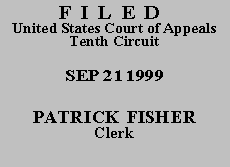

| BRAD ELZIE,
Petitioner-Appellant, |
|
| v. | |
| MICHAEL V. PUGH,
Respondent-Appellee. |
|
Petitioner Brad Elzie appeals the district court's dismissal of his application for relief under 28 U.S.C. § 2241 and the court's denial of his motion for reconsideration of that dismissal. We affirm.
Petitioner was convicted in 1995 in the Eastern District of Louisiana of attempt to possess with intent to distribute cocaine hydrochloride, and his conviction was affirmed in United States v. Elzie, 71 F.3d 878 (5th Cir. 1995) (table). His subsequent 28 U.S.C. § 2255 petition was denied in United States v. Elzie, 1996 WL 711508 (E.D. La. Dec. 9, 1996). In August 1998, petitioner filed a 28 U.S.C. § 2241 application in the District of Colorado, asserting (1) failure of the grand jury in its constitutional duties; (2) a deficient complaint because an attachment was not properly identified; (3) failure to file 21 U.S.C. § 851 information before trial; (4) failure of grand jury indictment to charge a federal offense; (5) speedy trial violations; (6) insufficient evidence to prove all essential elements of crime; (7) prosecutorial misconduct; (8) erroneous jury instructions; (9) error in voir dire; (10) erroneous admission of prior crimes evidence; (11) government misconduct; (12) judicial prejudice; (13) sentence was based upon error in PSR; (14) double jeopardy violation and violation of excessive fines clause; (15) conviction was unconstitutional; and (16) ineffective assistance of trial and appellate counsel. The district court dismissed petitioner's application, finding it was not properly filed under § 2241.
We review the district court's denial of petitioner's habeas petition de novo. Bradshaw v. Story, 86 F.3d 164, 166 (10th Cir. 1996). Petitioner has filed a notice of appeal only from the district court's order of dismissal and its order denying his motion for reconsideration. His allegations of error in the district court's refusal to recuse and failure to take judicial notice are not properly before us on appeal. See Scaramucci v. Dresser Indus., Inc., 427 F.2d 1309, 1318 (10th Cir. 1970).
The district court found petitioner's motion was not proper under 28 U.S.C. § 2241. The purpose of a § 2241 application for habeas corpus is to attack the execution of a sentence and it must be filed in the district where the prisoner is confined. Bradshaw, 86 F.3d at 166. A 28 U.S.C. § 2255 petition attacks the validity of a judgment and the legality of detention, and it must be filed in the district that imposed the sentence. Id. A review of petitioner's application reveals he alleges errors in his conviction that are the proper subject for a § 2255 motion.
Although petitioner's allegations are proper under § 2255, he could properly file a § 2241 application if the § 2255 remedy was inadequate or ineffective to test the legality of his detention. Id. Petitioner previously was denied relief in the sentencing court under § 2255.
Petitioner argues he is not authorized to file for relief under § 2255. Although successive § 2255 motions are restricted, they are not prohibited. See 28 U.S.C. § 2244(b)(2) (allowing successive motions if prisoner shows new rule of constitutional law or newly discovered evidence). Further, the mere fact that petitioner is precluded from filing a second § 2255 petition does not establish that the remedy is inadequate. See Caravalho v. Pugh, 177 F.3d 1177, 1179 (10th Cir. 1999). Petitioner has an adequate § 2255 remedy. The district court did not err in dismissing his § 2241 application.
Petitioner asserts the district court erred in denying his request to appeal in forma pauperis, thereby requiring him to pay the appellate filing fee. Petitioner alleges 28 U.S.C. § 1915 does not apply to § 2241 proceedings and Fed. R. App. P. 24(a) is unconstitutional. Although an appeal of a § 2241 proceeding is not a civil action for purposes of § 1915 (a)(2) and (b), petitioner still must comply with the good faith requirement of § 1915(a)(3) and Fed. R. App. P. 24(a). See McIntosh v. United States Parole Comm'n, 115 F.3d 809, 812 (10th Cir. 1997). The district court found petitioner failed to show the existence of a nonfrivolous argument on the law and facts in support of his issues raised on appeal. We agree.
AFFIRMED. Petitioner's motion to proceed on appeal in forma pauperis is DENIED. The mandate shall issue forthwith.
Entered for the Court
Mary Beck Briscoe
Circuit Judge
*.This order and judgment is not binding precedent, except under the doctrines of law of the case, res judicata, and collateral estoppel. The court generally disfavors the citation of orders and judgments; nevertheless, an order and judgment may be cited under the terms and conditions of 10th Cir. R. 36.3.